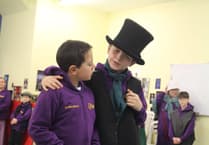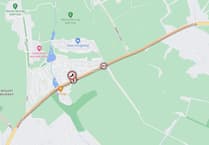A Manxman who founded the first mosque in Britain is being been remembered on the island and in Liverpool during the Muslim month of prayer, Ramadan, which began April 13 and ends May 12.
William Quilliam was born April 10, 1856, in Liverpool, but grew up on the island. His parents were Manx and they lived on a relative’s farm near Crosby.
He became a solicitor and was president of the Liverpool Manx Society.
His interest in the Muslim religion began in 1887 when he visited Morocco to recover from an illness, converting to Islam and from then on was known as Abdullah Quilliam.
On his return to Liverpool, he set up the first functioning mosque in Britain, the Liverpool Muslim Institute, in 1889, and became the centre of a small but flourishing Muslim community.
He also founded a school and an orphanage, and carried out a lot of good charity work focussing on the poor and needy in the city.
He was pivotal among Japan’s first Muslims, as it was a meeting with Quilliam in Istanbul which led to Shotaro Noda’s conversion and his returning to set up the first Muslim community there.
Quilliam was known as the Sheikh of Muslims in Britain, by such leaders of the Islamic world as the Ottoman Caliph, the Emir of Afghanistan, and the Shah of Iran.
In 1908, he lost his position as a solicitor, forcing him to sell up and move out.
He returned to the Isle of Man, living at Woodland Towers in Onchan, which he bought in 1903.
Quilliam was the subject of much ’skeet’, appearing odd and stood-out in a small community.
James Franklin of Culture Vannin explained: ’I think it was partly down to racism back then, as he was different and Muslim and it fell into certain tropes at that time, which was not quite understanding of polygamy - having a number of wives and having one family with a number of mothers.
’It was mistaken as a harem and having multiple lovers and was judged by Western and Christian standards.
’From that came the idea of moral decrepitude, as opposed to living the "correct" life, or just by different standards or religion. So they were meshed-up in the Manx [public’s] mind and that made someone who was part of a harem and that they lived in these "crazy" ways and wore strange, exotic clothes. Therefore, from that lots of lies and made-up stories were created about him.
’The Manx thought he was hiding things and that he was spying for the Turkish, it came from a dark place these forms of skeet.’
Quilliam’s biographer, Ron Greaves, wrote in Islam in Victorian Britain: The Life and Times of Abdullah Quilliam (2010): ’The media in the Isle of Man presented Quilliam as, ’one of the island’s most flamboyant characters,’ who, after a career ’as varied and exciting as a swashbuckling screen hero returned to his grass roots’.
’Most of these tales were generated on the Isle of Man and can be attributed to family gossip, the benefits of a colourful character for the local tourist industry and the inability of a conservative population that was made up of predominantly low-church Protestants to deal with eccentricity of any kind at the turn of the 19th century.
’To this list may be added a general protestant fear of Islam and the public’s fascination with the exotic East.’
Mr Franklin added: ’I think Quilliam is a fascinating figure in his own right and his openness to new cultures and it’s important to realise that as a part of Manx history.
’It’s always good to look into people like him because they not only show us a great part of Manx history, but also open up our own minds into news ways of thinking and new avenues. I think culture isn’t one thing and it’s important that we realise all of the different strands that make up the rich and wonderful thing that is culture in the island today.
’The Isle of Man is all the richer for having people of diverse religions and life outlooks, including the Muslim community.’
There is currently a fundraiser to establish a mosque on the island in Finch Road, Douglas, by the Isle of Man Islamic Association.
A planning application was submitted in October 2020 for a ’permanent home’ where the association can convert a building in order to worship, socialise and hold community events.
Members of the association would use the facility from 7pm onwards, with about 12 people using it on a regular basis including four or five during the day.
It is estimated that up to 50 people would attend Friday prayers, between 1pm and 2pm, with up to 60 a day attending during Ramadan.
The association said via its website: ’We are currently served by a small three storey converted house that’s been kindly donated to be used as a mosque. The current mosque can hold up to 24 people and there is a single washroom which is also the only place that wudu [cleansing ritual] can be performed.
’The premises has only one entrance and there are no facilities for a ladies prayer area.’
Today, Quilliam is regarded across Liverpool as an important figure who helped ensure Muslims could practice their faith in a dedicated space at the Abdullah Quilliam Centre, based on the original site of the first mosque in Brougham Terrace.
Director of the organisation Ajmal Masroor told the Manx Independent: ’Unfortunately, two of the original buildings have been sold but we took the task of renovating them, and we’ve spent about £1.8 million so far. We’re using the old prayer space currently while renovations continue.
’We’ve got ambitions to create the first mosque in Britain as a heritage space, a museum depicting Victorian life, with Victorian washrooms, libraries, a wedding room, kitchen and anything we can put our hands to and show how British Muslims in Victorian times lived in England and to show that Islam in Britain isn’t something new, that it’s been here a long time.’
Mr Masroor said he supports the Isle of Man Islamic Society’s fundraiser to build a mosque.
’It’s a fundamental human right [to have a mosque], and councils are usually very supportive of planning applications such as this.
’I believe the quicker we come together as a community and realise that Britain has permanently changed in becoming more inclusive and multi-cultural, the sooner we will become a powerful community and I think that will be our strength.’
To find out more about the Centre, visit: http://www.abdullahquilliam.org/.




